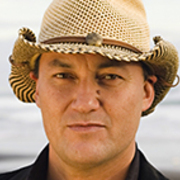
Toby Mills
Toby Mills has worked on stage and screen, and both on and off camera.
Mills graduated from Otago University with degrees in physical education and arts, and followed it with a year at drama school Toi Whakaari. He went on to act in short film The Find, this episode of cop show Shark in the Park, and Barry Barclay feature Te Rua. Mills was co-founder, manager and sometime actor in Māori theatre group Te Rakau Hua o Te Wao Tapu, which toured Kiwi schools and theatres. He also worked behind the scenes on a number of Wellington international arts festivals.
Tired of being typecast "in negative stereotypical roles", Mills decided to move from being on-screen to working behind it. After boning up on various aspects of filmmaking at Auckland's South Seas Film and Television School, he set up his own company, Tawera Productions Ltd in the mid 1990s. Worked with producer Aileen O'Sullivan, he directed 1995 prison documentary An Inside Story and The Family, about community trust Te Whānau O Waipareira, West Auckland's largest job training organisation.
Mills' passion for capturing traditional Māori knowledge had been clear from his first student project, a documentary about traditional Māori instruments, Taonga Puoro - A Story of Sound. He and his partner Moana Maniapoto also produced a documentary series in te reo for the iwi radio network on the topic, then followed it with another on traditional Māori healing.
In 2000, the couple teamed up for the first time on a television production. Award-winner Nga Morehu: End of an Era profiled four elders in te reo Māori. Mills' success in creating a relaxed filming environment for those being interviewed was reflected on-screen, and Māori Television commissioned a second award-winning profile, of master carver Pakaariki Harrison (2001). It won screenings in France and England. Further documentaries followed on golfing champions Michael Campbell and Phillip Taturangi (2004), Black Grace founder Neil Ieremia (2005, directed with Aileen O'Sullivan), and waka builder Hekenukumai Busby (2009 TV documentary The Bridge Builder, and 2022's feature-length Whetū Mārama - Bright Star).
In 2001, Tawera Productions produced television campaign It's about Whānau, to promote quitting among Māori smokers. The twelve 30-second commercials marked the first campaign of its kind produced by and for Māori. Campaign Te Ha o Te Ora followed.
In 2002 Mills wrote and directed Te Po Uriuri, a dark and stylish take on arranged marriage and retribution. The short film is based on a Shakespearian sonnet translated into Māori, and set in pre-European times. Te Po Uriuri had its international debut at the Munich Film Festival.
The following year Mills and Maniapoto won Best Māori Language Programme of the Year for their doco Syd Jackson: The Life and Times of a Fully Fledged Activist.
Guarding the Family Silver looked at the impact the intellectual property system has on Māori and the appropriation of traditional imagery and words in the global market place. The film world premiered at Toronto's Imagine NATIVE Festival in 2005, before playing at a number of indigenous film festivals, including the All Roads Film Festival and Toronto's World Indigenous Music Conference.
In 2006 Mills directed an hour-long documentary summarising the landmark Wai 262 Treaty of Waitangi claim (which included questons over intellectual rights). It was screened to the Waitangi Tribunal when the claim was presented.
Five years later Mills wrote and directed documentary The Russians are Coming. (Aileen O'Sullivan handled the dramatic sequences) Dominion Post reviewer Linda Burgess called it "a little ripper" Fronted by Moana Maniapoto, with input from Sir Tipene O'Regan, the documentary explores the moment in 1820 when bad weather forced Russian explorers to moor in the Marlborough Sounds.
During the He Kōrero Whānau educational strategy managed by Maniapoto, Mills set up the short film script and documentary pods, and co-produced the two documentaries that resulted. As longtime road and stage manager for Moana and the Tribe, Mills also works as a VJ, mixing visuals in response to Moana's kōrero and set list.
Profile updated on 23 May 2024
Sources include
Toby Mills
Moana website. Accessed 23 May 2024
Linda Burgess, 'The Russians are coming (again)' (Review) - The Dominion Post, 7 November 2011
'Keeping it in the whānau' - The Evening Post (TV Week liftout) - 13 September 1999, page 5